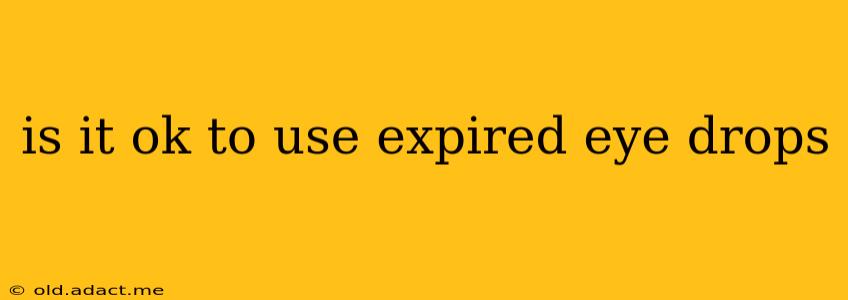Using expired eye drops might seem like a harmless act, especially if you only have a few drops left. However, the risks associated with using expired eye drops far outweigh any perceived convenience. This comprehensive guide will explore the potential dangers and answer common questions surrounding the use of expired eye drops.
What Happens When Eye Drops Expire?
Eye drops, like any other medication, have a shelf life. After the expiration date, the active ingredients begin to degrade. This degradation can lead to a decrease in effectiveness, meaning the drops might not treat your eye condition as intended. More importantly, the breakdown of ingredients can create harmful byproducts or allow the growth of bacteria or fungi, potentially leading to serious eye infections.
Can Expired Eye Drops Cause Eye Infections?
Yes, using expired eye drops significantly increases your risk of developing an eye infection. The compromised sterility of expired eye drops allows microorganisms to thrive, leading to infections like conjunctivitis (pinkeye) or more serious conditions. These infections can cause redness, itching, pain, discharge, and blurry vision. In severe cases, untreated eye infections can lead to vision loss.
What Are the Symptoms of an Eye Infection from Expired Eye Drops?
Symptoms of an eye infection from expired eye drops can vary in severity but often include:
- Redness and inflammation: Your eyes may appear noticeably red and swollen.
- Itching and burning: You may experience intense itching or a burning sensation in your eyes.
- Pain: Eye pain, especially upon blinking, is a significant warning sign.
- Discharge: A yellowish or greenish discharge from the eyes is a common indicator of infection.
- Blurred vision: Vision impairment can occur due to inflammation and infection.
- Sensitivity to light: Bright light may become uncomfortable or even painful.
How Long Are Eye Drops Good For After Opening?
The length of time eye drops remain effective after opening varies depending on the specific product and its preservatives. Always check the label for instructions on how long you can use them once opened. Typically, many eye drops are good for several weeks after opening, but some may only last a few days. Never exceed the recommended usage period after opening.
What Should I Do If I Accidentally Used Expired Eye Drops?
If you've accidentally used expired eye drops, monitor your eyes closely for any signs of infection. If you notice any symptoms like redness, pain, discharge, or blurred vision, seek immediate medical attention from an ophthalmologist or your doctor. Early treatment is crucial to prevent serious complications.
How Can I Avoid Using Expired Eye Drops?
- Check the expiration date: Always check the expiration date before using any medication, including eye drops.
- Proper storage: Store eye drops according to the label instructions, usually at room temperature and away from direct sunlight.
- Discard properly: Once the expiration date has passed or the recommended usage period after opening is over, dispose of the eye drops appropriately. Check with your local waste disposal guidelines for proper disposal methods.
- Don't hoard: Only purchase the amount of eye drops you need to avoid having expired medication.
Using expired eye drops is a risky behavior. Prioritize your eye health by discarding expired eye drops and always using fresh, unopened bottles. Your vision is precious, and it's never worth the risk of infection or permanent damage.
